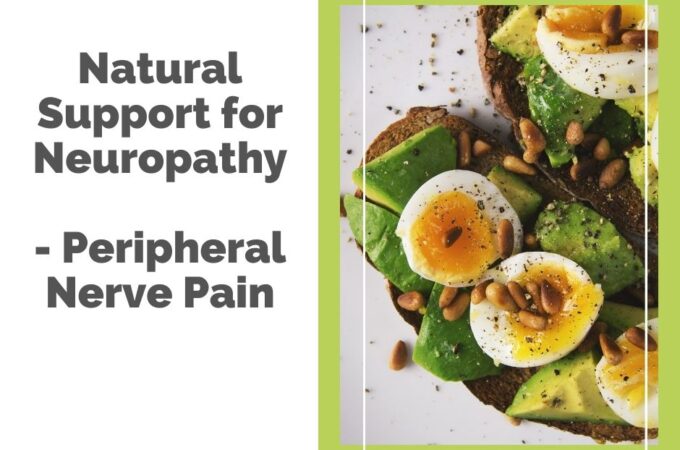
Natural Support for Neuropathy – Peripheral Nerve Pain
More than 20 million people in the U.S. suffer neuropathic pain or nerve pain. [source]
Prescription medication may help symptoms of neuropathy but they don’t address the root cause and have a long list of side effects. If you are ready to work on ways to address the root cause and heal, no matter if it is a slow process, then keep reading.
Can nerves regenerate?
“The nervous system is divided into two camps. There is the central nervous system (CNS) which is your brain and your spinal cord. Then there is the peripheral nervous system (PNS), which is everything else.” [source]
“Injured nerves in the peripheral nervous system, including motor and sensory nerves supplying muscles and sense organs respectively, have the capacity to regenerate and reinnervate their target organs.” [source]
“Nerves typically regrow at 1 to 2 millimeters per day, meaning that an adult with nerve damage around their kneecap might require a year to recover as the nerve re-extends back to the foot. “ Jeff Twiss, a UofSC biology professor [source]
Causes of peripheral nerve damage
- Diabetes – the leading cause of neuropathy in the U.S. Over 60% of people with diabetes have mild to severe forms of nerve problems that can cause numbness, tingling, or burning sensations in the feet or numbness and weakness on the trunk or pelvis.
- Autoimmune disease where the body attacks its own tissue including nerves (e.g., Sjogren syndrome, lupus, rheumatoid arthritis). [source]
- Hormonal imbalances.
- Among the most common cause of hormonal imbalance is diabetes (the hormone insulin).
- Imbalances in testosterone, estrogen and progesterone levels might also have a negative effect on peripheral nerves.
- Progesterone is an important protective agent against various injuries to the nervous system. I recommend using topical bioidentical progesterone as this is the best way to avoid taking pills that cause the hormone to be changed in the liver during digestion.
- Untreated hypothyroidism can cause peripheral neuropathy.
- Toxin exposure. Toxic substances can enter the body causing harm to the peripheral nerves. Recreational drugs, heavy metals, industrial chemicals, and biological toxins including mold.
- Medications (antibiotics, cardiovascular medications). [source]
- Kidney and liver disorders can result in the build up of toxic substances in the body that causes neuropathy.
- Bariatric surgery. Often neurological complications are seen after bariatric surgery.
- Nutritional deficiencies resulting in low levels of certain B vitamins, minerals like magnesium and copper, Vitamin E and Vitamin D are known to contribute to neuropathy. [source] See my recommendations below.
- Alcohol abuse.
- Infections (e.g., chickenpox, shingles, herpes simplex, Lyme disease, Epstein-Barr virus, hepatitis C, leprosy, HIV). [source]
- Physical trauma and injury
Nutrition for healing.
Eat an anti-inflammatory diet with healthy fat, moderate clean protein, vegetables, fruit, seeds, nuts. Read The Reclaim Diet for all the details. You can reclaim your health regardless of your age or current health state. The Reclaim Diet leads you on an exciting journey of truth and discovery to help you take control of your health and quickly get results.
This is a low carb/keto way of eating that is eliminating all processed food.
Fasting from dinner until breakfast will also help, giving you a fasting window of about 12 to 14 hours. [source]
Spikes in blood sugar will glycate proteins on the myelin sheath of nerves. Glycating myelin sheath causes your immune system to destroy your nerve ending (phagocytosis). Your immune system is attacks nerves with chronic inflammation.
There are many anti-inflammatory foods that can be incorporated into your daily meals and snacks.
- Ginger with anti-inflammatory Gingerol. Freshly grated into tea or food.
- Turmeric – nerve repair with curcumin, anti-inflammatory and pain reduction
- Walnuts – brain food, repair myelin sheath, faster recovery for damaged nerves.
- Chamomile – tea, healing comforting, antioxidants, ease neuropathic pain. Daily tea made with loose herbs.
- Green tea – Epigallocatechin gallate (EGCG) can have a protective effect on peripheral nerves. Epigallocatechin gallate (EGCG) is a major, active component in green tea and may scavenge free radical oxygen and attenuate inflammation. Three cups of green tea is equal to about 200 mg EGCG.
- When taking EGCG for a virus protocol, Dr Zelenko, MD recommends 400mg one time a day for seven days.
Eat Mineral Salt (brand Real Salt)
Nerves need salt and they are made of fat.
Read more about proper hydration and why it includes being intentional with mineral salt.
Lab Tests can help pinpoint the cause of neuropathy if you are unsure [source]
- Fasting Insulin
- HbA1C – Hemoglobin A1C
- Vitamin B12 – low B12 levels can lead to worsening of peripheral neuropathy
- Complete Thyroid Panel
- Vitamin D3
- Complete Blood Count (microcytic anemia may indicate vitamin B12 or folate deficiency)
- Complete Metabolic Profile (electrolyte imbalances can contribute to neuropathy along with renal failure as uremia can also lead to neuropathy)
- Vitamin and Mineral deficiency testing
- Heavy metal testing
- Infectious disease testing
- Genetic testing to include testing for MTHFR genetic defect.
Nutritional support for peripheral neuropathy.
For nerve repair to occur the nerve must have the appropriate nutritional building blocks for repair, growth or regeneration. Supplements and nutrient dense foods that provide adequate vitamins, minerals and antioxidants can be very helpful. I will talk briefly about the supplements that I recommend for neuropathy and building health.
Nerve Support SAP
One supplement, Nerve Support SAP, is a comprehensive neurological support formula. This is recommended to be taken along with a methylated B Complex and sublingual B12.
- Serving Size: 1 capsule, take three times a day
- Vitamin B1 … 85.5mg
- Vitamin B12 … 333mcg
- Vitamin B6 … 16.67mg
- Acetyl-l-carnitine hydrochloride … 500mg
- R-alpha-Lipoic Acid … 100mg
- B Vitamins vital for nerve function
- There are eight key vitamins in the vitamin B complex. The entire complex works together for optimal health. They are water soluble, which means they are eliminated from your body the same day they are ingested.
- B vitamins have the potential for treating neuroinflammation and neuroregeneration. [source]
- I recommend taking a methylated B Complex along with additional sublingual B12.
- Vitamin B12 is needed for proper nerve function
- B12 deficiency can lead to a number of clinical consequences that include hematologic abnormalities, nerve demyelination and peripheral neuropathy. [source]
- B12 supplementation improves nerve function and reduces pain scores. [source]
- B12’s beneficial effects include the regeneration of nerves and the inhibition of certain pain-signaling pathways.[source]
Magnesium
- Magnesium is a mineral that is involved in over 300 enzyme reactions in your body. It assists in nerve function and can help with pain, numbness and tingling. The recommended dosage is 400 to 800 mg daily. Be sure to take absorbable forms like magnesium glycinate and avoid magnesium oxide.
Electrolytes
- Potassium is an electrolyte that is in your body’s cells. It transmits electrical signals between cells and nerves. Recommended dosage is 500mg daily, best taken as an electrolyte powder in water.
- Sodium and chloride are two other important electrolytes. Avoiding salt is going to lead to electrolyte imbalances. Choose mineral salt like Redmond’s Real Salt and avoid white salt, even salt labeled as sea salt that is white has had the beneficial minerals removed making it an unhealthy choice. Sodium levels benefit neurological function. Consume Real Salt at meals and add an electrolyte powder supplement that includes potassium.
Omega-3 Fatty Acids + Vitamin D
- Omega 3 fatty acids must be consumed in food and supplements. Omega-3’s decrease inflammation, enhance insulin function, are important for brain structure and function. Omega-3’s help with tingling feelings in arms or legs. Try 2-3 tsp Carlson’s Cod Liver Oil daily or ProOmega 2000 gel capsules.
Vitamin D3
Vitamin D deficiency is a risk factor for diabetic neuropathy. [source] [source]
Vitamin E as Mixed Tocopoherols
One symptom of Vitamin E deficiency is peripheral neuropathy. Vitamin E is an antioxidant. Oxidative stress affects nerve health but this can be reduced by adequate Vitamin E supplementation. [source]
Other Beneficial Nutrients found in Nerve Support SAP
- R-Alpha Lipoic Acid (ALA) – found in Nerve Support Complex shown above.
- ALA enhances nerve conduction, shields nerves from oxidative damage
- Acetyl L Carnitine – found in Nerve Support Complex shown above.
Epigallocatechin-3-gallate (EGCG)[source]
- EGCG, the most abundant and active component of green tea, has multiple biological activities. It is regarded as a compound with potential therapeutic effects in many diseases.
- EGCG can help reduce inflammation and is able to modulate many pathological conditions (eg, cancer, inflammation, diabetes, neurodegenerative disorders, liver disease, and metabolic syndrome).
- EGCG has protective effects on pain or neuronal injuries, peripheral nerve damage, and diabetic neuropathy
Lion’s Mane Mushroom
- Lion’s Mane a medicinal mushroom promotes nerve regeneration after injury and helps alleviate neuropathic pain.
- The combination of compounds in lion’s mane helps stimulate neurogenesis and promote neuron connectivity, ultimately leading to better communication between brain cells
- The active compounds in Lion’s Mane promote neuron projections, extending and connecting to other neurons. [source][source][source]
- I prefer Lion’s Mane Mushroom Tincture
- Add two droppers under your tongue for fast absorption or add to your favorite beverage.
Curcumin promotes nerve regeneration
- Curcumin, a polyphenol of Curcuma longa, shows antioxidant, anti-inflammatory, and neuroprotective effects and has recently shown efficacy in the mitigation of various peripheral neuropathies. [source][source][source]
Red light therapy. Photobiomodulation.
Red light therapy was shown to induce nerve cell activation, have a positive effect on metabolism of the nerve cells, and to stimulate nerve sprouting processes. See my post here.
Near infrared light therapy in the range of 800 – 100 nm wavelength is highly successful with repairing damaged nerves. This wavelength has the deepest penetration into the body.
Photobiomodulation, or red light therapy, uses light to exert a healing and regenerative influence on the body. It stimulates mitochondria to decrease pain and accelerate healing. Red light therapy speeds up healing of nerves four times faster. [source]
The light deceases inflammation and increase circulation allowing for oxygen and other vital nutrients to be delivered to the damaged nerves.
Red light units should cover large areas of the body. I would avoid a wand or hand held device.
Nerves grow and heal very slowly.
It may take a long time to see changes, taking weeks or months for nerves to regrow. Commit to the plan for the long term to realize the benefits possible. If anything makes it better, it is worth while.
Recommended
-
Dandelion for Liver Support and Health BenefitsJuly 20th, 2024
-
Modified Citrus PectinJuly 11th, 2024
-
Bentonite Clay Mask for Face and ArmpitsJuly 8th, 2024
-
Two Supplements for Erectile DysfunctionJune 30th, 2024









